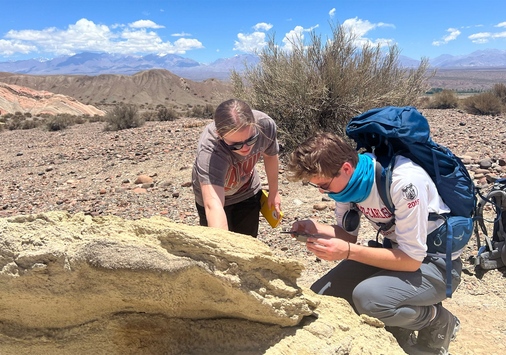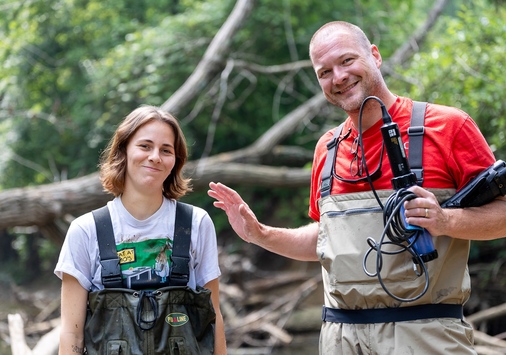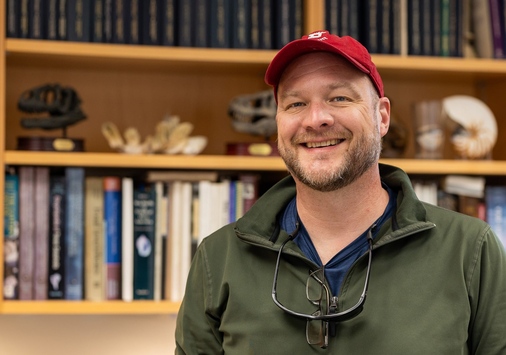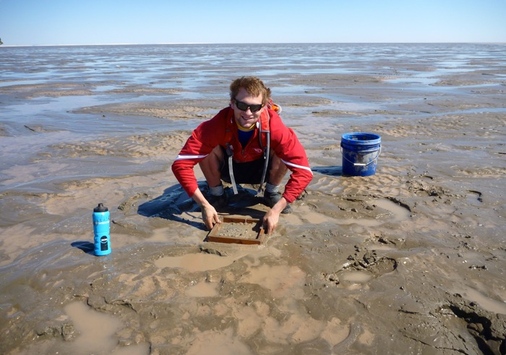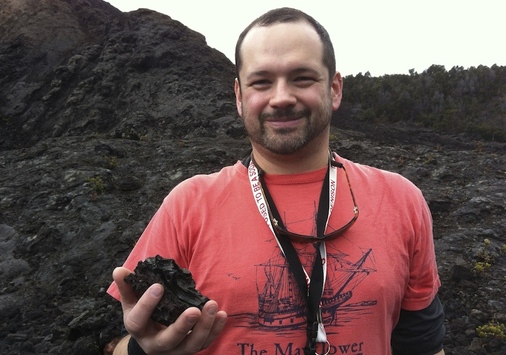Degree Requirements
Majors in the Earth & Environmental Sciences Program
NOTE: Any student who matriculated in, or after, the Fall of 2018, is eligible to graduate with an EESC degree.
There are three possible paths to the bachelor's degree in Earth & Environmental Sciences: a Bachelor of Science in anticipation of advanced study in the Earth Science or a Bachelor of Science in anticipation of advanced study in Environmental Science, or a Bachelor of Arts in the Earth Science for those who seek a less specialized course of study. Earning a B.A. degree does not preclude a professional career in the Earth Science, although admission to some graduate programs may require completion of additional science and mathematics courses.
DEGREE REQUIREMENTS BELOW:
| Code | Title | |
|---|---|---|
| 1. Bachelor of Arts in Earth Science (10 four-credit courses + 1 one-credit course) | ||
(a) Students must take one (1) Introductory Course: | ||
100-Level EESC Course | ||
(b) Students must take the following three (3) EESC Foundation Courses: | ||
| EESC 200 | Environmental Geology | |
| EESC 210 | Historical Geology | |
| EESC 211 | Rocks, Minerals & Soils | |
(c) Students must take at least three (3) of the following Earth Science Core Electives: | ||
| EESC 300 | Geomorphology | |
| EESC 308 | Biodiversity Through Time | |
| EESC 311 | Structural Geology | |
| EESC 312 | Petrology and Volcanology | |
| EESC 314 | Sedimentology & Stratigraphy | |
(d) Students must take three (3) additional Earth Science Electives (200-level or above). One Earth Science elective can be replaced by a natural science cognate course (see section 2e). | ||
(e) Students must take EESC 380: Senior Seminar (1 credit) in their senior year. (EESC 380 is open to all sophomore, junior and senior EESC students.) | ||
| 2. Bachelor of Science in Earth Science (14 four-credit courses + 1 one-credit course + Field Course) | ||
(a) Students must take one (1) Introductory Course: | ||
100-Level EESC Course | ||
(b) Students must take the following three (3) EESC Foundation Courses: | ||
| EESC 200 | Environmental Geology | |
| EESC 210 | Historical Geology | |
| EESC 211 | Rocks, Minerals & Soils | |
(c) Students must take at least three (3) of the following Earth Science Core Electives: | ||
| EESC 300 | Geomorphology | |
| EESC 308 | Biodiversity Through Time | |
| EESC 311 | Structural Geology | |
| EESC 312 | Petrology and Volcanology | |
| EESC 314 | Sedimentology & Stratigraphy | |
(d) Students must take three (3) additional Earth Science Electives (200-level or above). | ||
(e) Students must take four (4) Natural Science Cognate Courses: | ||
| BIOL 210 | Molecular Biology and Unicellular Life | |
| BIOL 220 | Multicellular Life | |
| BIOL 230 | Ecology and Evolution | |
| CHEM 131 | Atoms and Molecules: Structure and Dynamics | |
| CHEM 132 | Organic Structure and Reactivity | |
| CS 111 | Discovering Computer Science: Scientific Data and Dynamics | |
| DA 101 | Introduction to Data Analytics | |
| MATH 135 | Single Variable Calculus | |
| MATH 145 | Multi-variable Calculus | |
| MATH 220 | Applied Statistics | |
| PHYS 121 | General Physics I | |
| PHYS 122 | General Physics II | |
(f) Students must take EESC 380: Senior Seminar (1 credit) in their senior year. (EESC 380 is open to all sophomore, junior and senior EESC students.) | ||
(g) Students must take EESC 400: Field Course EESC 400: Field Course, also known as “Field Camp,” is a four to six credit course taught at other institutions, generally during the summer | ||
| 3. Bachelor of Science in Environmental Science (14 four-credit courses + 1 one-credit course) | ||
(a) Students must take one (1) Introductory Course: | ||
100-Level EESC Course or ENVS 102: Science and the Environment | ||
(b) Students must take the following three (3) EESC Foundation Courses: | ||
| EESC 200 | Environmental Geology | |
| EESC 210 | Historical Geology | |
| EESC 211 | Rocks, Minerals & Soils | |
(c) Students must take the two (2) Environmental Science Core Courses: | ||
| BIOL 230 | Ecology and Evolution | |
| CHEM 131 | Atoms and Molecules: Structure and Dynamics | |
(d) Students must take three (3) of the following Environmental Science Core Electives: | ||
| EESC 234 | Applied GIS for Earth and Environmental Sciences | |
| or ENVS 222 & ENVS 223 | Geographic Information Systems I and Geographic Information Systems II | |
| EESC 240 | Earth Resources | |
| EESC 270 | Oceanography | |
| EESC 300 | Geomorphology | |
| EESC 308 | Biodiversity Through Time | |
| EESC 310 | Global Biogeochemical Cycles | |
| EESC 313 | Environmental Hydrology | |
| EESC 314 | Sedimentology & Stratigraphy | |
| EESC 333 | Stable Isotopes in the Environment | |
(e) Students must complete a five (5) course Environmental Science Concentration (ESC). Developed in consultation with a member of the EESC faculty or a departmentally approved affiliate, the ESC must include four (4) Environmental Science Electives and one (1) Human Environment Elective selected from the approved list (see below ). One semester of Senior Research may be substituted for a single science elective. The ESC must be approved by the EESC faculty no later than the end of the sophomore year. | ||
| Environmental Science Electives | ||
| BIOL 210 | Molecular Biology and Unicellular Life | |
| BIOL 220 | Multicellular Life | |
| BIOL 321 | Plant Ecology | |
| CHEM 132 | Organic Structure and Reactivity | |
| CHEM 331 | Intermediate Analytical Chemistry | |
| CS 111 | Discovering Computer Science: Scientific Data and Dynamics | |
| DA 101 | Introduction to Data Analytics | |
| ENVS 215 | Renewable Energy Systems | |
| ENVS 274 | Ecosystem Management | |
| Human Environment Electives | ||
| ANSO 224 | Human Origins and Prehistory | |
| ECON 202 | Microecon Analysis Lec | |
| ENVS 236 | Political Ecology | |
| ENVS 240 | Environmental Politics and Decision Making | |
| ENVS 284 | Environmental Planning and Design | |
| ENVS 334 | Sustainable Agriculture | |
| PHIL 210 | Philosophy of Science | |
| PHIL 260 | Environmental Philosophy | |
(f) Students must take EESC 380: Senior Seminar (1 credit) in their senior year. (EESC 380 is open to all sophomore, junior and senior EESC students.) | ||
(g) Environmental Field Camp is recommended but not required. | ||
Students who want to pursue graduate study in the Earth & Environmental Sciences are strongly encouraged to take additional math and science courses beyond this minimum requirement.
Both B.S. and B.A. students are required to pass a comprehensive exam, administered early in the second semester of the senior year.
Note that most upper level EESC courses are offered in alternate years. Therefore careful schedule planning is important, especially if one pursues a semester of off-campus study.
Minor in Earth & Environmental Sciences
(6 four-credit courses)
| Code | Title |
|---|---|
(a) Students must take one (1) Introductory Course: | |
100-Level EESC Course | |
(b) Students must take the following three (3) EESC Foundation Courses: | |
| EESC 200 | Environmental Geology |
| EESC 210 | Historical Geology |
| EESC 211 | Rocks, Minerals & Soils |
(c) Students must take two (2) Additional EESC courses at the 200-level or above. | |
Additional Points of Interest
Earth & Environmental Sciences has a long tradition of field trips during the fall and spring semester. Recent trips include Hawaii, coastal Maine, Arizona & Utah, the Bahamas, Death Valley, the Great Smoky Mountains and the Adirondacks.
Abundant student research opportunities are available, including working with faculty in the field or laboratory. Student employment opportunities within the department include working as teaching and laboratory assistants, and assisting in developing and maintaining departmental collections.
The C.L. Herrick Geological Society is an active, student-run organization, which coordinates guest lectures and social events throughout the academic year.

